In Rural Bangladesh, Latrine Businesses Prove Vital to Nutritional Health
Image

This blog, written by Ashfaq Enayetullah, was originally published on Agrilinks.
Lack of sanitation is an underlying yet pivotal factor in malnutrition. Besides causing diarrhea—which can suddenly wipe out nutritional gains, particularly endangering young children—longstanding inadequate sanitation is responsible for a condition called environmental enteropathy, which limits absorption of calories and nutrients. In Bangladesh, this is a chronic danger: Only 54 percent of the population have access to basic sanitation services.
Ms. Rani Begum, a widow from Charbhadrashan Upazila in Faridpur District, knows very well the connection between sanitation and nutrition.
“I had an unhygienic latrine in my house which was in a miserable condition,” she said. “Me and my only son used to suffer from stomach issues very often and had to spend a good amount of money every month.”
To accelerate nutrition outcomes, the Feed the Future Bangladesh Nutrition Activity prioritizes better sanitation through extensive engagement with the private sector, including support for latrine businesses, collaboration with sales representatives, and tapping the talents of a local advertising agency to raise awareness. These combined interventions enable rural latrine producers to scale up production and sales of improved latrines and promote safer sanitation services.
Building capacity and public-private connections
Since 2019, the Activity has trained 153 rural latrine producers who have sold over 25,000 improved latrines. These have benefitted more than 115,000 rural individuals in four districts of Bangladesh: Faridpur, Khulna, Patuakhali and Cox’s Bazar.
Activity training for latrine producers and the masons who install them covers improved latrine technologies, product marketing, sales, business growth, communication, and production center management. The Activity also emphasizes environmental and gender-sensitive concerns by encouraging people to install two-pit latrines and site the latrines close to their homes, which women tend to prefer. Latrine producers also share experiences and insights about suitable types of latrines for different geographic areas with other participants and facilitators.
Government officials from the Department of Public Health Engineering join the sessions as co-facilitators, which helps align the Activity’s interventions with national priorities and ensure sustainable positive change. Sales representatives, mainly from RFL Plastics Limited (RPL), also co-facilitate sessions to promote their products and establish linkages with the latrine producers. This connection ensures quick delivery of RPL products, discounted to encourage bulk purchasing.
Creating awareness and generating demand
The Activity also partners with an advertising agency to facilitate various awareness-raising and demand-creation events to promote latrines and other sanitation improvements. These include door-to-door visits, school sessions, and rural daily market activities such as LP center decoration. The trained latrine producers also showcase their products at nutrition fairs, group sales meetings, and courtyard sessions. In 2022, this awareness-raising campaign has reached 8,000 rural households lacking improved latrines.
“After attending one of the group sales meetings organized by (latrine producer) Shahinur Islam, I got to know that improved latrines are not that expensive, and it ensures a healthy life,” Ms. Begum said. “Now, me and my son do not suffer from any stomach issues, his school absenteeism [is lower] than before, and he can concentrate on his studies.”
From October 2022 to June 2023, the activity will train 90 more latrine producers expected to sell around 7,000 improved latrines, providing access to over 30,000 additional rural individuals like Ms. Begum. Post-training, latrine producers have reported expanding their businesses thanks to new technical and marketing knowledge.

